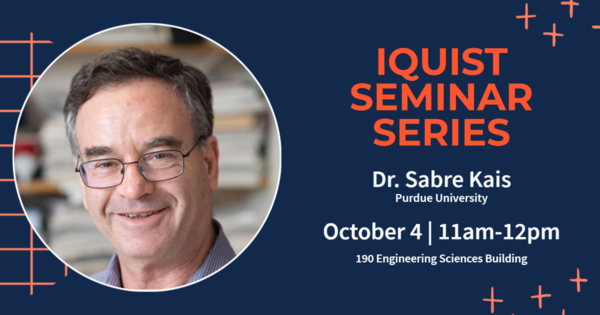
IQUIST Seminar: "Quantum Machine-Learning for Complex Many-Body Systems," presented by Sabre Kais, Purdue University
- Event Type
- Seminar/Symposium
- Sponsor
- IQUIST
- Location
- 190 Engineering Sciences Building, 1101 W Springfield Ave, Urbana, IL 61801
- Date
- Oct 4, 2022 11:00 - 11:50 am
- Speaker
- Sabre Kais, Professor, Department of Chemistry, Purdue University
- Contact
- Hannah Stites
- hstites2@illinois.edu
- Phone
- 217-300-4072
- Views
- 222
- Originating Calendar
- IQUIST Seminar Series
Quantum Machine-Learning for Complex Many-Body Systems
Abstract: In this talk, I will focus on quantum machine learning, particularly the Restricted Boltzmann Machine (RBM), as it emerged to be a promising alternative approach leveraging the power of quantum computers. Such algorithms have been developed to solve problems like electronic structure calculations of molecular systems and spin models in magnetic systems. However, the discussion in all these recipes focuses specifically on targeting the ground state. Herein we demonstrate a quantum algorithm that can filter any energy eigenstate of the system based on either symmetry properties or a predefined choice of the user. The workhorse of our technique is a shallow neural network encoding the desired state of the system with the amplitude computed by sampling the Gibbs−Boltzmann distribution using a quantum circuit and the phase information obtained classically from the nonlinear activation of a separate set of neurons. We implement our algorithm not only on quantum simulators but also on actual IBM-Q quantum devices and show good agreement with the results procured from conventional electronic structure calculations.
Finally, I will discuss and illustrate that the imaginary components of out-of-time correlators can be related to conventional measures of correlation like mutual information. Such an analysis offers important insights into the training dynamics by unraveling how quantum information is scrambled through such a network introducing correlation among its constituent sub-systems. This approach not only demystifies the training of quantum machine learning models but can also explicate the capacitive quality of the model.
Bio: Sabre Kais received the BSc, MSc, and Ph.D. degrees at the Hebrew University of Jerusalem in 1983, 1984 and 1989, respectively. From 1989 to 1994, he was a research associate at Harvard University, Department of Chemistry. He joined Purdue University in 1994 as an Assistant Professor of Theoretical Chemistry. Currently, he is a distinguished Professor of Chemical Physics, a Professor of Computer Science (courtesy) a professor of Physics at Purdue University. He has published over 260 papers in peer-reviewed journals. The research in his group is mainly devoted to finite size scaling, dimensional scaling, quantum information, and quantum computing for complex systems. He was the director of NSF funded center of innovation on “Quantum Information for Quantum Chemistry”, from 2010-2013. He served as an External Research Professor at Santa Fe Institute from 2013-2019. He is a Fellow of the American Physical Society, Fellow of the American Association for the Advancement of Science, Guggenheim Fellow, Purdue University Faculty Scholar, National Science Foundation Career Award Fellow, 2012 Sigma Xi Research Award, and 2019 Herbert Newby McCoy Award, Purdue University.